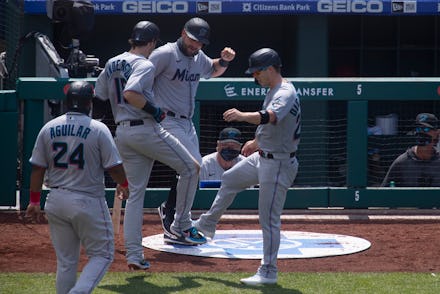The ill-advised MLB season is already spiraling out of control

After an opening weekend filled with creepy cardboard cutouts of fans, fake crowd noise, and otherwise empty stadiums, the MLB season is already facing its first significant coronavirus outbreak. After learning that eight additional players and two coaches tested positive for COVID-19 on Monday, the Miami Marlins have postponed their home opener against the Baltimore Orioles. On Sunday, the Marlins were already aware of three new cases, with a fourth positive result from Friday. They still played against the Phillies on Sunday afternoon. Naturally, Monday night’s Phillies’ game — in which the Yankees were set to use the same visiting clubhouse as the Marlins — has also been postponed.
Under ideal leadership, this would signal the end of an already bizarre season that never should have begun in the first place. Back in March, the NBA shut down its season after just one positive case from Utah Jazz center Rudy Gobert. Whether you credit it to how little we knew about the coronavirus pandemic, or the fact that Gobert made a point to deliberately lick and cough on the press pool’s microphones, it was a swift decision. Now, more than 150,000 deaths later and with only a marginally better understanding of COVID-19’s transmission and mitigation, the MLB season forged ahead in the face of record-high case counts anyway.
According to a report from The Athletic, Marlins manager Don Mattingly said the team “never really considered not playing” on Sunday after the results came in. The piece cites two epidemiologists who classify this as a team outbreak, with testing delays likely to infect more players than first expected. “They’ve got 10 percent or more of their entire (traveling) group positive. That suggests that there’s a high probability that more people are going to end up testing positive,” Dr. John Swartzburg, a clinical professor emeritus at UC Berkeley’s School of Public Health, told The Athletic. It does not portend well for the season’s future if the first team outbreak only took days.
Every international precedent suggested that this was a dubious plan. The Korean Baseball Organization kicked off its season to empty stadiums in May, but only after the country had significantly reduced its outbreak. Canada’s government, which has managed the outbreak down to daily death counts in the low single-digits, barred the Blue Jays from playing in Toronto as the season began in the U.S. Even Anthony Fauci, who’s been championed as a paragon of reason in the administration’s virus efforts, tacitly endorsed the opening weekend by throwing out his dribbler of a first pitch at the season debut.
MLB commissioner Rob Manfred took something of an early victory lap in an interview with the New York Times. He told the paper that his mindset leading up to the truncated, pandemic-stricken season boiled down to: “We cannot be the one sport that doesn’t figure out how to play.” That breathless pursuit of exceptionalism, which is endemic to the entire American response to the coronavirus crisis, will be the very thing that keeps the country from returning to anything resembling normalcy, like the crowds who’ve returned to Korean baseball games. Federal and state officials have jettisoned nearly every mitigation effort that’s proved effective, so while it’s tempting to focus squarely on another industry that’s chosen profits in the face of mass death, that’s just part of the picture. Manfred and the MLB never should have allowed the season to continue, but government officials shoulder the burden of blame for encouraging them to take the field.